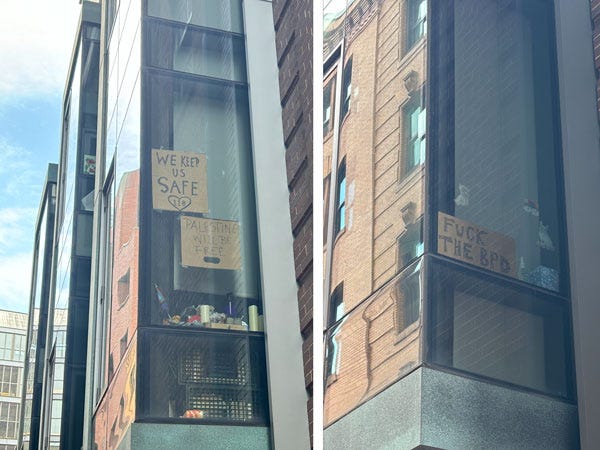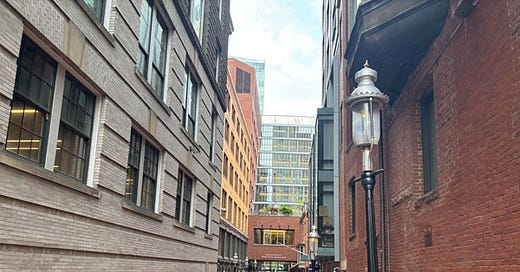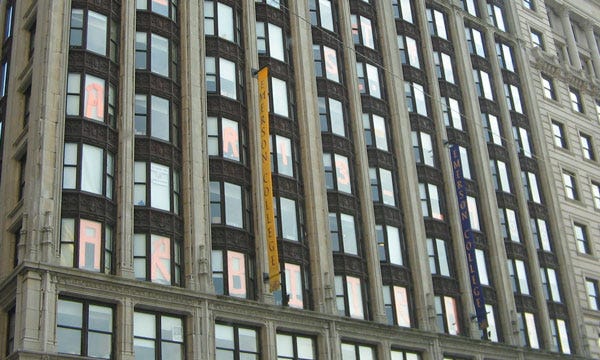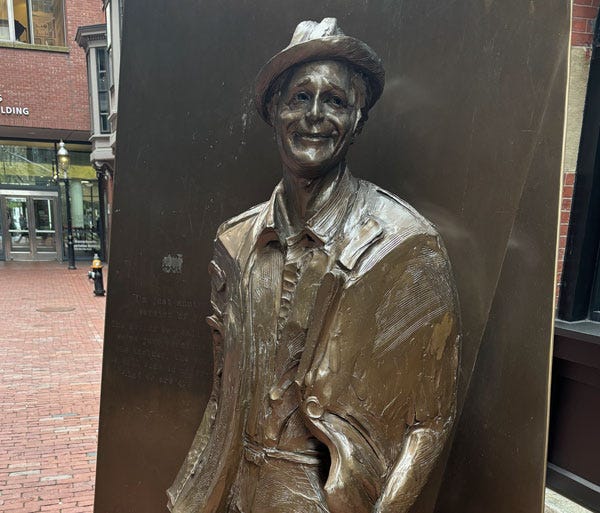Wednesday Walk: From Emerson's Campus
Reflecting on the Gaza Solidarity Protests and the arrest last week of more than 100 Emerson College students in Boston
Welcome to Willoughby Hills!
Usually on Wednesdays, I offer a few short ideas that I hope will inspire you to do some more reading, thinking, and exploring.
This week, I wanted to explore one theme from a few different angles: the Gaza solidarity protests at Emerson College, my response to them, the administrations response, and what lessons Emerson might hold for other colleges.
I wrote this piece last night, however the context of it has changed in the time between writing it and publishing it.
Overnight, hundreds of NYPD officers in riot gear were brought onto Columbia’s campus to quell the student occupation of Hamilton Hall. From early reports, it sounds like officers entered through a second floor window and set off tear gas on the peaceful protestors.
I am still publishing what I had written with the hopes that it will be helpful to some of you, but wanted to add this note to acknowledge the escalating violence which continues on campuses around the country.
Arrests at Emerson
Last week, a Gaza Solidarity Encampment was erected by students at my alma mater Emerson College in Boston.
For those unfamiliar, Emerson is a small private liberal arts college. It is known for producing well-known graduates in media and performing arts, especially in the fields of film and television.
Emerson is also known for having a fairly vocal student body that is willing to speak out against injustices in the world. When I was there in 2005, I remember students decorating their dorm windows in solidarity with union arbitration, which I believe was being negotiated between teachers and administration at the time. These windows faced out onto Boston Common and were a highly visible form of silent protest.
Unlike many universities which have a sprawling campus of several buildings separated by lawns, Emerson’s “campus” is a series of random buildings clustered at the edge of Boston’s theatre district. There is no campus green like at Harvard, Tufts, or some of the other schools where Gaza Solidarity Encampments are located.
As such, Emerson students built their camp in a small alleyway known as Boylston Place, which is mostly used to access Emerson buildings but also serves as a back entrance to the state transportation building.
After several days of threats, Boston Police cracked down on the protestors early last Thursday morning, violently throwing many to the ground, and arresting more than 100 people. The videos filming the arrests show a violent police force set loose on a peaceful group of students.
A Letter to the President
I awoke on Thursday morning to the news of the arrests and was shaken and angry. I had similar feelings watching police violence at other schools, but there was something more personal about the arrests at Emerson College. As an alum, I felt like I was in a position to speak out directly and make my voice heard.
I decided to send an email to college president Jay Bernhardt. I am copying the email below, in part to give you some insight into my thinking at the time, and in part to provide a template to anyone who wishes to email their own school administrators who may also be facing similar confrontations on campus.
Even though I was furious, I felt like an accusatory email would not have been well received. I tried to find the balance between expressing my extreme sadness and disappointment, while also leaving the door open to the possibility that the president’s mind could be changed and he could join in solidarity with the students, rather than be in opposition.
Dear President Bernhardt,
I am a 2005 graduate of Emerson College. After school, I went on to lead a successful TV show for many years, have been nominated for 10 Emmy Awards and won twice. I met my wife while we were both attending Emerson. I used to be very proud of my association with the college.
I am writing to express my dismay, shock, and frankly sadness of the decision by your administration to escalate violence against the student protestors in Boylston Place overnight.
It has been nearly 7 months since the Israeli army has launched this current assault of Gaza, killing more than 40,000 people, many of whom are children. While this may seem a distant reality from the campus of Emerson, the situation in Gaza directly impacts many in the Emerson Community.
Every university in Gaza has been destroyed. Journalists have been targeted in attacks, with more than 100 dying over the last seven months. If Emerson will not speak out in solidarity with murdered journalists, what message does that send to current journalism students?
As I’m sure you know, the Emerson encampment is one piece of a larger movement happening across college campuses right now, requesting that schools divest from investments in Israel. I was not on campus, but from everything that I have seen from news reports, this was a peaceful protest that posed no real safety risk to the city or the school community. Questions of noise violations are dubious in an area with many bars and restaurants and few if any residential spaces outside of Emerson dorms.
Your answer to these protests could have been peaceful. You could have shown transparency in how Emerson funds are invested. You could have pledged to divest from companies directly engaged in violence in Palestine. You could have met with student leaders to understand their concerns. Instead, you chose to escalate the situation by calling the police on student protestors, many of whom were students of color, leading to violence on campus.
One of my favorite parts of Emerson’s culture was its embrace of all perspectives and viewpoints. Campus was a safe place to express oneself and share new ideas with fellow students, faculty, and staff. That culture is clearly no longer thriving and I am no longer proud to call myself an Emersonian.
I ask you to please drop the charges against these protestors. I also ask you to please listen to their demands about divestment. The murder of Palestinians is our modern day Holocaust. It’s not too late to stand on the right side of this issue and to lead other schools across the country by example. Please realize that your actions in this moment are your legacy.
Sincerely,
Heath Racela
BA TV/Video 2005
The President Responds
I am no doubt one of hundreds of alumni who reached out in some capacity, because on Sunday, President Bernhardt responded with a mass email to the campus community. Here is what he wrote:
Dear Emersonians:
As we begin a new week, I wanted to share some reflections on the past few days and where we are today as a campus community.
In my relatively short time at Emerson, I have come to deeply value our community’s strong and passionate views, even when they are sometimes hard to hear. I respect and support how our students, faculty, and staff embody those values in their actions. It takes immense bravery to speak out and act in support of a cause. As an institution, the College may not take positions on global conflicts, but our overarching goal is for Emerson to be unyielding in our support for our students’ education and their ability to find and express their voices.
Last week, 118 protesters were arrested in Boylston Place Alley, where an encampment was established, like at many other campuses across the nation, to draw attention to the tragic loss of life of Palestinians in Gaza. As a community, whatever our position on the conflict, we should respect their right to raise their collective voices while also acknowledging the disruptions created by their encampment occupying a public right-of-way.
Because we are committed to our students’ right to protest, Emerson made every possible effort to avoid confrontation between the police and the protesters at the encampment. Prior to the law enforcement action, the College advocated with the City and Boston Police Department for several days to delay the removal of the encampment. When it became clear the City intended to clear the tents from the alley, we actively encouraged the protestors to remove them to prevent arrest. We also strongly and directly advocated for the police to peacefully remove tents without making arrests.
We know that the events of that night were, and are, emotionally overwhelming for our entire community, especially for the students present at the protest and the staff and faculty who were on site to provide support. Emerson has continued to be supportive in multiple ways – sending staff to all the precincts and posting bail for arrested students, canceling and modifying classes so our community could process what had occurred, and providing additional care and support for our community to heal.
The College will not bring any campus disciplinary charges against the protestors and will encourage the district attorney not to pursue charges related to encampment violations. We will also provide housing support to students required to stay in town for court appearances following the closing of their dorms.
But these are only initial steps toward healing and growth.
As leaders of Emerson College, we are responsible for creating a safe environment for our entire community. This responsibility includes physical and emotional safety and assuring that our public and private spaces are free from harassment or intimidation, including Antisemitism and Islamophobia. Emersonians from all backgrounds and beliefs must always feel welcome and safe at our College, and we must all share the responsibility of enforcing this core value without exception or excuse.
The College has done its best to keep all community members safe every day during these challenging times, but we recognize that we must do more. Our leadership team is committed to redoubling our efforts, engaging and respecting all voices across our community, and actively listening and learning how to move forward together.
Though we are nearing the end of the academic year, our commitments to free expression, safety, and an inclusive community will remain top priorities for our leadership team far beyond this semester. We ask you to join us now and in the future to learn from the events of recent days and weeks to help us build the safe, passionate, and unified community that we all desire and deserve.
Respectfully,
Jay Bernhardt
President
The Aftermath
There are parts of President Bernhardt’s letter that reframed some of my thinking. It was unclear to me who had been the responsible party for the arrests. The president seems to be saying that because this was a public alleyway, Boston Police ultimately had jurisdiction and that his administration requested a peaceful deescalation, a request that was clearly not heeded.
Further, I appreciated the actions that Emerson is taking to support the students. Not imposing disciplinary action, posting bail, and providing housing to those students who may need to appear in court outside of the school year are all important gestures. At many schools across the country, protestors are not only being arrested by authorities, they are also being expelled from school and evicted from housing. I wish more schools would follow the lead that Emerson is setting.
Without reading too deep, President Bernhardt and the Emerson administration seem to paint themselves as the good guys, or certainly not the worst guys. Bernhardt’s letter seems crafted to let the community move on from the events of last week and give up the fight.
To an extent, this was successful. There is currently no protest of any kind on the Emerson campus, while these encampments continue to spring up on campuses across the world. Dissent was squashed, partially through police violence and partially through a seemingly responsive administration.
Still, I’m not placated by the rhetoric.
President Bernhardt’s letter does not address the central concern of the protests: divestment from companies arming the Israeli offensive. There is no mention of it at all.
There has been no space within campus to allow for protest to my knowledge, nor has protest been allowed to continue.
I walked through the Emerson campus earlier this week and the alleyway that had been the site of these protests and violent arrests a few days earlier was eerily quiet and clean, as though nothing had ever happened.
The only signs of any resistance were a few handmade signs in dorm windows, hanging maybe 15 feet above where more than 100 students had been brutally arrested.

My alma mater’s campus may be quiet for now, but I am encouraged by the dozens of other protests still happening. I am grateful to the students who truly are willing to put their reputations, bodies, and lives on the line to stand up for what is right. I am hopeful that their courage will rub off on the adults who are otherwise supporting this genocide or standing by silently allowing it to happen.
As I left Boylston Place this week, I couldn’t help but notice that there was a statue that had been installed in 2018 but that I didn’t realize was there. The bronze statue honors Emerson alum Norman Lear, the famous producer behind groundbreaking shows like All In the Family, Sanford and Sons, Maude, Good Times, The Jeffersons, One Day at a Time, Diff’rent Strokes, to name just a few.
Lear’s shows were all about the social tensions of their times and how race, politics, and war impacted people of different backgrounds and ages. He was a strong supporter of first amendment rights and progressive political causes.
Lear passed away last December at 101 years old. How symbolic that a statue in his honor would have been right at the center of this clash. The fight for justice is long, and it takes protestors, organizers, and yes, even artists to push for real and lasting change.
Even if the tents are no longer in the alleyway, the fight continues. Palestine, and all of us, will be free.
I publish new issues every Wednesday and Sunday. Sign up to always receive the latest issue and support my work:
Other Wednesday Walks
If you’ve missed past issues of this newsletter, they are available to read here.








Thank you Heath!! Definitely sharing, especially to my twin who graduated in 1995. It’s continually disappointing to see higher Ed duck and dodge divestment along with not protecting their students (in this case the administration should have known that ‘The Alley’ (as us townies call it) was public and should have provided a safe space to protest. I’m relieved to hear that students won’t be penalized but the trauma of police brutality never goes away, especially for the Black and Brown students who are subjected to it daily.
Thank you for your commentary. It is necessary to not forget those journalists who sacrifice their lives.